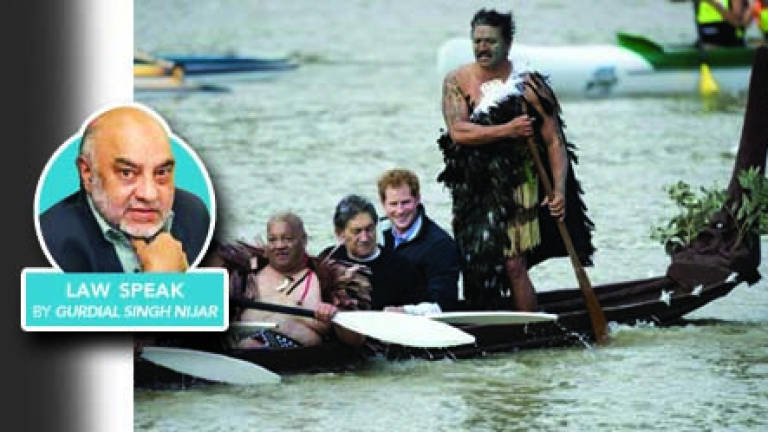Column - Be warned, rivers and trees can sue

THE New Zealand Parliament has given its Whanganui river a legal personality. This means it is recognised in law as having the same rights as a natural person; innovative as this may sound, the concept is nothing new.
After all companies are not natural persons. Yet, they have long since been given the rights and obligations of natural persons. And through their directors – the "eyes and ears" of the corporation – they can sue and be sued in court. Indeed, the NZ spokesperson said that the river will be treated "in the same way a company is".
The NZ attorney-general elaborated: "(It) will have its own legal identity with all the corresponding rights, duties and liabilities of a legal person. The approach of granting legal personality to a river is unique."
Unique perhaps. But long overdue. For it is the indiscriminate felling and burning of our forests and pollution of our rivers that has increased the incidence of diseases, says the World Health Organisation; and in its wake, climate change – which threatens to drown out small island states, flood countries and cities, and wreak havoc on agricultural systems which supply us our daily bread.
Yet court rules on who can sue (in law called "locus standi") have denied the right to sue for damage to the environment. Because, seemingly, no one owns these diffused rights to the ambient air or the waters of these rivers.
Even to sue for recognised rights, you have to prove that you are affected more than anyone else. So, a native community was denied standing to sue for the flooding of its land to make way for a dam – because it cannot show it is affected more than others.
This illiberal position was not always so. In a landmark 1982 decision, a fisherman was given the right to challenge a mentri besar for allotting land to himself and state ministers. The land had been promised to him. Justice Datuk Wira Wan Yahya made a dramatic ruling. He said the MB's putative corrupt action could be challenged by every citizen or any public spirited person. Because:
In a Government so firmly founded on the principles of justice and the rule of law, the Judiciary cannot idly stand as a silent and stony pillar of democracy. The court, in its role as a public watch dog, is not expected to turn a deaf ear to the prevailing public outcry against corruption and abuse of administrative powers by authorities or their officials, however high in rank. .... The time has come for public authorities to be compellable to perform their duties constitutionally and, if they transgress any law or constitutional directive, then any public-spirited citizen, even if he has no greater interest than a person having regard for the due observation of the law, may move the courts and the courts may grant him the appropriate legal remedy available at their discretion. Public interests demand that a wider and more liberal construction be given to the class of persons who could qualify as having a right or interest to such a remedy. In our courts the mendicant may in appropriate circumstances challenge the act of a Minister if the exercise of such act appears to be unlawful, or against public interest.
This dramatic liberalisation of the rules on standing were nullified later in 1998 by a narrow 3-2 majority Federal Court decision UEM v Lim Kit Siang – bucking a worldwide liberal standing trend.
Mercifully, an enlightened 2006 Court of Appeal decision distinguished this ruling and established standing for "redressing public injury, enforcing public duty, protecting social rights and vindicating public interest" to vindicate the Rule of Law: QSR Brands v Suruhanjaya Sekuriti. The Federal Court sealed this approach in its 2014 decision: MTUC v Menteri Tenaga. It declared that a real and genuine interest exists to vindicate the public interest and the rule of law.
Back to the right of rivers and trees. Can they sue polluters and loggers in our courts? In NZ, yes – through two guardians given the role of protecting the river: one from the state and the other from a Maori tribe claiming it as its ancestral river since the 1870s.
Significantly, there is an emerging Earth jurisprudence movement – inspired by Thomas Berry – which says all components comprising the earth community have the same legal rights. So, all are subjects to be communed not objects to be used. And each component is capable of having rights derived from the same source that humans get their rights: from the universe that brought them into being. Every component has three rights: the right to be, the right to habitat, and the right to fulfil its role in the ever-renewing processes of the Earth community. All rights are role-specific or species-specific, and limited. Rivers have river rights. Birds have bird rights. Insects have insect rights. Humans have human rights. Difference in rights is qualitative, not quantitative. Human rights do not cancel out the rights of other modes of being to exist in their natural state. Human property rights are not absolute. Property rights are simply a special relationship between a particular human "owner" and a particular piece of "property", so that both might fulfil their roles in the great community of existence.
This emerging jurisprudence advocates that human activity cannot impinge or destroy other rights of the components of the planet. It has to be in harmony with, and not destructive of, other rights. Else the predator will be liable to be sued.
Ecuador's Constitution recognises the rights of Nature in all its forms. Not property to be plundered; it has the right to exist, persist, maintain and regenerate its vital cycles.
Perhaps these are pointers to the way forward: to stop the wanton destruction and studious pollution of the components of Mother Earth – before anthropogenic activity and greed extinguishes and engulfs us all.
Comments: letters@thesundaily.com